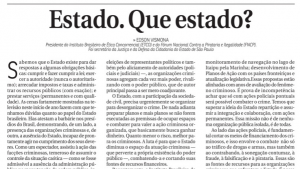 State. Which state?
State. Which state?
By: Edson Vismona (*)
We know that the State exists to provide answers to some basic obligations: comply with and enforce the law; exercise authority (never authoritarianism); collect taxes and fees and manage public resources (with exception); and provide services (permanent and with quality).
The scenes abundantly shown on television at the beginning of this year make us doubt the role of the Brazilian State. They attest to barbarism in prisons in Brazil, demonstrating, on the one hand, the presence of criminal organizations and, on the other, the absence of the State, unable to promptly act in the discharge of its duties.
As a spectator, he watched the action of the criminal factions, fearful of taking control of the chaotic situation - as if the absence of public administration in maintaining public order was permissible, thereby ignoring their primary obligations.
This omission is shameful. It is true that the federal government, in the face of disaster, after assessing the situation, put forward the presentation of yet another national security plan. The question is: how long will we discuss plans without effective implementation? The diagnosis is known: in the absence of the State, crime occupies the space and has acted with great organization and fearlessness. In addition to prisons, action is urgent. From the borders to the cities, we have organized crime occupying spaces and earning billions of reais from smuggling (especially cigarettes), drug trafficking, weapons and ammunition, piracy, evasion, fraud in the sale of fuel, forgery of products and documents .
By seeking insertion in public institutions - which happens through active participation in the election of political representatives and also by the enticement of authorities (police and judicial) - criminal organizations are increasingly adding power, rivaling public power, which the main author becomes a mere supporting role.
The State, with the participation of civil society, urgently needs to organize itself to disorganize crime. There is no point in preparing plans and more plans if the premises of occupying spaces and fighting for real organized criminal action, which basically seeks to make money, are not carried out. The lower the risk, the better for criminals. The struggle is for the State to reduce the scope of criminal activity - which perverts the very existence of public power -, fighting it and cutting off its sources of financial resources. Recently, the Brazilian Institute of Competition Ethics (ETCO) and the National Forum Against Piracy and Illegality (FNCP) participated in a meeting at the Ministry of Justice and Citizenship discussing actions to combat theft and theft of vehicles and cargo and presented 21 proposals to assist in the urgent definition of strategies to fight against crime, especially at the borders.
Adopting a systemic and systematic vision, fundamentally, the following were suggested: the integration between the intelligence of the police forces (federal and state), the Federal Revenue, Coaf, Abin and the Armed Forces, identifying the most critical points and implementing cooperative actions; investment in control technology and human resources, enabling prompt repression response; identification of suspicious financial transactions, using the means to suppress them; implementation of a navigation monitoring system in the Itaipu lake by the Navy; development of Action Plans with border countries and legislative updating.
These proposals are in line with years of assessment of the criminal phenomenon. It is proof of incompetence to think that only with specific police actions will it be possible to fight crime. We have to overcome the idea of the State sharing and assume integration and collaboration, with permanent actions. This mission is not of any isolated public organization, it is of all. Along with police actions, it is essential to cut off the criminals' means of financing, and this involves combating not only drug and arms trafficking, but also smuggling, persistent evasion, fraud, counterfeiting and piracy.
These are the sources of funds for criminal organizations facing the state. It is our duty to dry them. Once again, to think that this illegal market is not significant for the financing of criminal organizations is a clear lack of knowledge, intellectual disability or bad faith. It should be noted that the growth of criminal organizations and brutal corruption are sides of the same coin, threatening the values and principles of the Democratic Rule of Law and the country's development.
With the erosion of ethics and non-compliance with laws, we lose the support of institutions and the possibility of sustainable economic growth. As an answer to the question in the title of this article, we need a State that is effective in fulfilling its obligations. It's time for quick, coordinated action. In short, it is time for quick and coordinated action. We are already late and tasked with acting in the midst of chaos.
Article published in the Correio Braziliense newspaper, 02/02/2016
(*) Edson Vismona is president of the Brazilian Institute of Competition Ethics (ETCO) and of the National Forum to Combat Piracy (FNCP)




